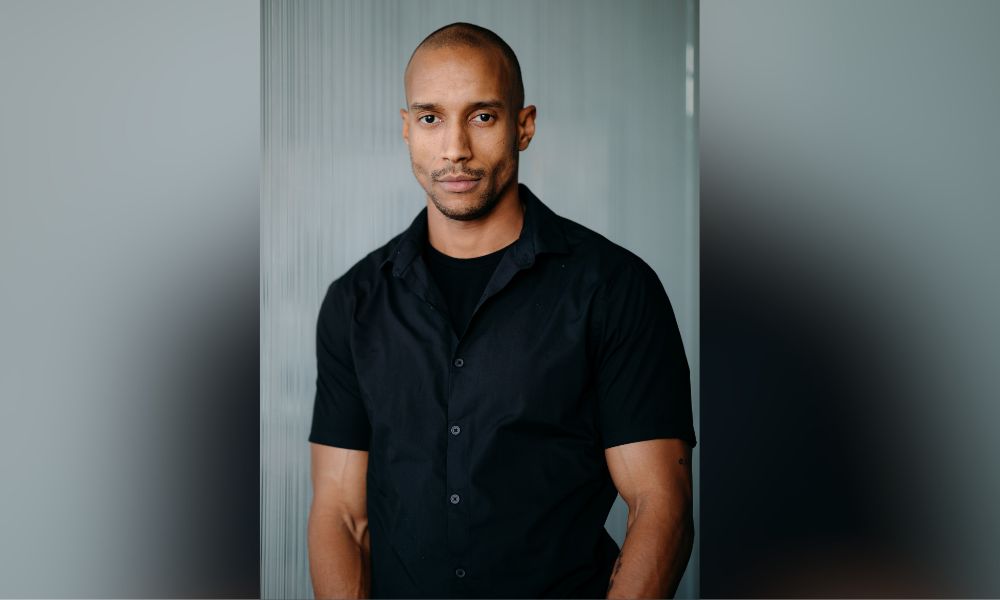When people choose to go vegan, there’s usually one of several entry points — a love for animals, a desire to minimize impact on the environment, health concerns or (sometimes) doctor’s orders.
The journey for the now famous, top athlete Kollins Ezekh — known to his more than 198,000 followers on Instagram as the @plantbasedboxer — started with two values: curiosity and compassion.
Ezekh was born in the Communist USSR but moved with his family at age 12 to Thailand, where he fell in love with Thai boxing as a way to become strong and also sidestep bullying.
Fitness soon became a passion, which he followed to the United States in pursuit of a coaching career. He landed at the Mayweather Boxing and Fitness gym in Los Angeles, California, where he noticed a trend among his clients who eschewed meat and other animal products from their diets.
Curious, he asked about why they chose to go plant-based — then decided to give the lifestyle a try himself.
Ezekh then became more aware of the horrific conditions facing millions of farmed animals in slaughterhouses and decided that veganism was the choice that would allow him to live best aligned with his highest values.
Like becoming a good boxer, becoming vegan required commitment, patience, practice, and a supportive community for Ezekh, who shared more with Lady Freethinker about his story as well as some tips and tricks for working more plants into a daily diet.
The following Q & A has been edited for length.
You can keep up with Ezekh on Instagram at @plantbasedboxer, which chronicles his boxing career, as well as @builtbygod, which includes details from his personal, everyday life.
A Q&A with Kollins Ezekh: Athlete, Fitness Coach, and Plant Based Boxer
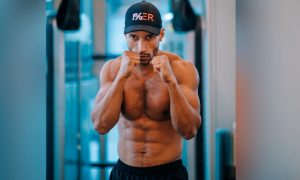
Kollins Ezekh (Courtesy)
Tell us more about your journeys into fitness and veganism.
My mom got me involved in taekwondo when I was in elementary school. We moved to Thailand when I was 12, where I started with Muay Thai. When I finished university, I wanted to go to the United States to pursue my interests in fitness and helping people.
Los Angeles is the capital of healthy people who work out and have different dietary requirements! I got “vegan curious” and wanted to know what it was all about. I have always been on the healthier side (I don’t have health problems), but I do love animals. I thought, “If I don’t have to kill animals to live, why would I?”
How and why did you ‘go vegan’?
I became vegetarian for a month. I lost a little muscle mass, because I wasn’t eating what I needed to. But I didn’t give it up because I was very passionate about changing the world, and I wanted to choose to live by example. So I started to research and to make sure I was getting the right nutrients. And now, being vegan works well for me — I run marathons, have boxing matches, went for a 25-mile bike ride on Sunday. Our bodies are so amazing; they can adapt.

Kollins Ezekh (Courtesy)
What ultimately helped you stay with a vegan lifestyle?
Part of me becoming vegan was growing and evolving as a person. I’m pretty determined when I decide to do something. At the time I was becoming vegan, I also wanted to challenge myself to do hard things. When I started going by the “Plant Based Boxer,” I received so much support from the vegan community that helped me and also held me accountable. There is definitely a community around a goal like this. I also started focusing less on what I looked like as an athlete and more on my performance. Being vegan today is about what I stand for and believe in.
How does your chosen lifestyle align with your values?
At some point, I realized the only thing I have to do on this planet is be the best person I can be and to not hurt anyone else in the process. And my life became so much simpler after that.
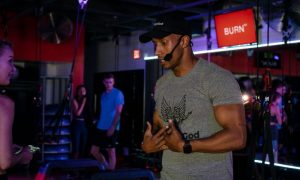
Kollins Ezekh (Courtesy)
Tell us more about your connection to animals and how that informs your lifestyle.
My grandfather and family had animals when I was growing up, and I always had fun and good memories of them. Then I learned about what happens to animals in the food chain and slaughterhouses. The only way to really help them was to be the change I wanted to see.
I realized that it had to be about more than just “loving” animals. I know there are people who say they love animals and have a dog, but then they eat chicken. Every living soul should be treated equally. It doesn’t matter if you are a dog or a human; I don’t want to hurt either.
How has your openness about being vegan — and an athlete — helped defy some people’s perceptions about what it means to be ‘vegan’?
There are people who think of vegans as skinny and weak, or that to be a “real man” you have to eat meat. But it’s been proven that you can compete at top levels as a plant-based athlete. It can be more difficult, but you are choosing a harder way. I like to tell people, “If I can do it, you can do it!”
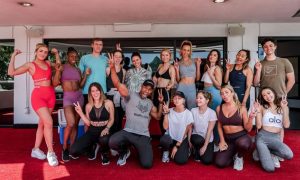
(Courtesy of Kollins Ezekh)
So what do you typically eat in a day?
When I wake up, I have water, and about 30 minutes later I will have a smoothie with greens and proteins, banana, blueberries, Vitamin D and Vitamin K. For breakfast, I typically will have oatmeal with berries, avocado toast on whole grain bread, or an acai bowl sometimes. I try to snack throughout the day, every few hours, with fruits and nuts because my metabolic rate is pretty high. For lunch, I’ll have a bean and rice burrito (Chipotle has a good option, just ask to have it without cheese or sour cream) or Thai or Indian food, which has a lot of carbs to fuel my body for a long day. Dinner is lighter, usually a salad with avocado and tofu or sweet greens, garbanzo beans, lentils, or quinoa for protein.
Were there any vegan foods that grew on you?
(Laughs) I hated tofu for a long time! Until about two years ago, when I realized it is such a good substitute for meat when it’s organic.
What advice do you have for our vegan readers?
To be a healthy vegan, you still have to read the labels. Sugar is probably one of the biggest problems right now. Vegan desserts can taste as good as regular desserts, but while people think it’s healthier, you have to pay attention to the nutrition. Just because something is “vegan” does not mean it’s healthier. For example, you wouldn’t want to eat an Impossible Burger every single day because it’s still “fast food”; you have to eat whole foods, and you can have processed foods every now and then.
Sometimes cooking for yourself or asking people to cook for themselves, if it doesn’t come out right, can turn people away from plant-based living. Part of being plant-based and vegan is taking your friends to vegan restaurants! Have them explore, so they have a good experience.
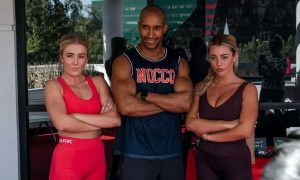
(Courtesy of Kollins Ezekh)
What tips do you have for people wanting to go vegan — or just get more plants into their diets?
Sometimes when people think about going vegan, they feel like they have to go toss everything in their fridge. But many people already are eating vegan meals —oatmeal or avocado toast — and they just don’t think of it that way.
It’s like running a marathon — you start by taking a step. People have to start somewhere, even if it’s just one plant-based meal per week. Start by finding vegan or veggie options that you like and then incorporate the other things. Integrating things slowly is usually the best way to make a sustainable change.
You can also try eating at more vegan restaurants, or choosing vegan options at other restaurants, and then maybe shift to choosing healthier foods or cooking at home.
Also, by far, find a support system. The people in it don’t have to be vegan, but they have to understand your perspective and your goals. But when you do hang out with vegans, there’s a higher chance that you also will go vegan. Surround yourself with a circle of people living the life you want.

